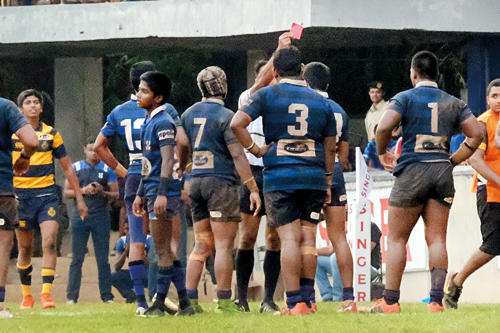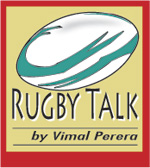Rules are there to abide and not to bend or break
View(s):
A Red Card in rugby is a serious and rare offence. At school level it's all about discipline - FIle pic by Amila Gamage
A break before the commencement of the second round of schools rugby will do a lot for the welfare of players as the use and misuse appears to be marking its presence as more injuries are seen. It is not only the prevalent heat that is affecting players but also the demands for more presence on the field for key players.
With another week left for Schools Rugby second round game to commence and the break would give players the opportunity to recover from the burn-out. I have seen on field injuries and dissipating players.
Teams that have been prudent in approach as well as in opportune use of the bench seem to be coping with the heat better than those who have had a tendency to continue using players despite niggling injuries. An issue for concern is the misunderstanding in the mind set of some or more often many who tend to think a player with a suspected head injury can be assessed and return to play within a ten minute period.
This follows the allowing ‘returning to play’ in club rugby. This is a thinking that went beyond the World Rugby Laws which allow the head injury assessment and return in ‘Elite Tournaments’ and only when approved by World Rugby. This is allowed and approved for ‘elite adult rugby Matches’.
Approval is given by World Rugby for access to the temporary replacement procedure in the ‘elite adult’ game if the relevant approval criteria identified is which includes The Tournament or Matches are ‘elite adult’ tournaments or matches.
Though Sri Lanka allowed head injury assessment and return; can you by any figment of imagination think that Sri Lanka which does not even compete in the ARFU fifteen-a-side game in the lower level be considered as ‘elite’.
Somebody in a bout of stupid wisdom allowed same but this should not cause concern in school rugby and taken as a precedence for schools to have a ‘head Injury assessment’. People who are so concerned for examine and return should also revisit the provision to allow rolling substitutes to help players given the prevalent heat which I think would be there next year too.
World Rugby says that any ‘child or adolescent player’ (aged 18 years or less) with concussion or suspected concussion must be immediately and permanently removed from training or the field of playing and must not return to training or to play in a Match on the same day and until symptom free. At the same time the said player must have complete physical and cognitive rest for 24 hours. Given the background I am at a loss to understand why match officials try to send back players after such injuries.
This is not an indication for the 10 minute assessment but has come to be known as ‘recognise and remove’.
The world rugby’s ‘Recognize and Remove’ message incorporates six R’s which has includes recognise, remove, refer, rest, recover and return. The view of some is whether a referee knows about head injury recognition. World rugby match official programmes require the completion of certain on line pre requisites which include awareness of first aid requirements. Same requirements are present for world rugby courses for coaching of players. This includes a pocket SCATZ (Sports Concussion Assessment Test). Match officials and coaches have to know the recognition of a head injury, applying a memory test and if necessary carry out a balance test. In school rugby there is a match day doctor whose duties are clearly stated in the manual both in English and Sinhala.
The referees should take the situation under control when players refuse to leave the field and or coaching and other attendant staff refuses to adhere even after the mach-day doctor recognises and wants removal. Take a simple line of calling the captain an advising him that action will be taken under misconduct. Do it once or twice and things will fall in line? Go for the red!!
 I was also surprised to see on two occasions where the ambulance and or match-day doctor was not present. The home team has decided that they don’t need a match-day doctor as appointed by the match organisers. It is best for all schools match-day personal as well as organisers to read the tournament manual and be aware of the responsibilities and obligations. If something was to go wrong; the day will not be long before there will be a law suit for neglect. People will also need to understand and be aware of who can enter the playing enclosure and the playing area. Why are match officials including the match commissioner reluctant to take action during the match and or report after the match?
I was also surprised to see on two occasions where the ambulance and or match-day doctor was not present. The home team has decided that they don’t need a match-day doctor as appointed by the match organisers. It is best for all schools match-day personal as well as organisers to read the tournament manual and be aware of the responsibilities and obligations. If something was to go wrong; the day will not be long before there will be a law suit for neglect. People will also need to understand and be aware of who can enter the playing enclosure and the playing area. Why are match officials including the match commissioner reluctant to take action during the match and or report after the match?
But then what can you expect when those trying to tell others on how and what has to be done cannot by themselves interpret and apply in situations such as the pickup in a ruck or obstruction. Repeated offside or look at a simple forward pass. Some tell me that the coaches have not done a proper job. Well if you don’t penalise and it is allowed match after match the coaches will definitely use that to their advantage.
This is not a fault of anybody but part of the prevalent culture of impunity in society and particularly in rugby. For example if world rugby states these are the qualifications needed to sit and ponder and deliver application of world rugby regulations and a person sits despite the fact that he is not eligible how can you expect him to know what has to be done. The rule follows and that is fact in the theories of conditioning.
Vimal Perera is a former player, coach referee and an IRB Accredited Referees’ Educator


